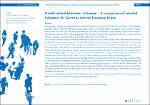Health-related behaviour in Europe – A comparison of selected indicators for Germany and the European Union
Lange, Cornelia
Finger, Jonas D.
Demographic change, new health threats, but also inequalities in health and health care provision in and between European Union (EU) member states pose major albeit similar challenges to European health systems. Regular information on health and health-related behaviour is essential if member states’ health systems are to respond and develop appropriately to these challenges. The ‘European Health Interview Survey’ (EHIS) is a vital source of data for indicators of health status and health-related behaviour in the EU. This article presents a comparative review of health-related behaviour at the European level. Health-related behaviour is of particular relevance because an unhealthy diet, physical inactivity, obesity, smoking, and harmful use of alcohol are among the most important determinants associated with non-communicable chronic diseases. Eurostat has used data from EHIS Wave 2 to publish details about the current prevalence of obesity, daily fruit and vegetable intake, health-enhancing aerobic physical activity, smoking and heavy episodic drinking for the EU’s member states. In the following, the figures for Germany are compared to the European average. A wide range of prevalences exists between the various EU member states, in some cases stretching to more than 50 percentage points. In Germany, the prevalence of obesity and smoking remains relatively close to the EU average. Moreover, the results on physical activity are especially welcome. In particular, the proportion of women and men who undertake adequate levels of physical activity decreases more slowly with increasing age compared to the EU average. Nevertheless, the low fruit and vegetable intake, especially among younger generations, and the high proportion of women and men who drink six or more alcoholic beverages on one occasion (heavy episodic drinking) at least once a month pose problems for Germany. In summary, the results provided by EHIS offer a basis for sharing experiences between EU member states regarding effective measures in health promotion and disease prevention.
Files in this item
No license information

